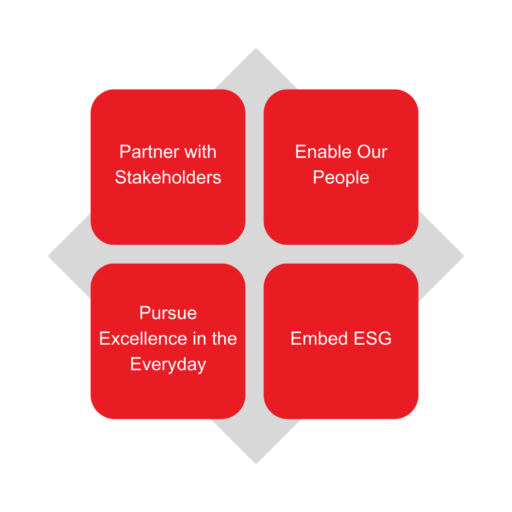Strategy Implementation Groups (SIGs)
Our Commitments

Strategy Implementation Groups (SIGs) have been established to action four strategic initiatives this year (2024). Each SIG has cross-departmental membership, an F&A senior leader acting as an Executive Sponsor, and “backbone” support provided by the Office of Quality Initiatives (OQI). The initiatives were identified and voted on by the leaders and are intended to advance the division’s strategy by addressing a common issue or opportunity. Below is a brief overview of each of the four SIGs.
SIG Update #1 – Coffee Hour Presentation (Aug. 28)
Promoting a Digital Mindset (Executive Sponsor: Valerie Turner)
The Issue:
Many Microsoft applications/tools are not being used to their full potential and there are inconsistent practices and uses of these applications which can lead to inefficiencies and risk. Also, there is a belief that artificial intelligence (AI) will be able to enhance efficiency by addressing common issues or tasks, but there is currently a lack of understanding about AI’s opportunities and limits at Carleton.
Objectives:
To promote a digital mindset across the F&A division, this SIG will focus on three levels of digital literacy. At the foundational level, this SIG seeks to understand the gap between the potential of Microsoft tools (which Carleton already invests in), and their actual use/uptake across teams. The SIG will then try to close the gap by enhancing knowledge, comfort and use of these tools. At the intermediate level, this SIG aims to develop best practice guidelines for a few select processes and tools to support consistency, efficiency, and effectiveness. Lastly, at the advanced level, this SIG aims to pilot the use of AI (Co-Pilot) among a defined group and task to capture and share the challenges, opportunities, and potential impact.
F&A Front Door (Executive Sponsor: Brian Billings)
The Issue:
There is currently no central phone number or email for general F&A inquiries, so departments and units often receive inquiries that have little to no connection to their actual work. For F&A, these “misdirected” inquiries take time and resources to re-direct, while for clients (faculty, staff, students and the public), this lack of clarity can lead to delays and frustration in having their issues addressed.
Objectives:
This SIG aims to enhance efficiency by reducing the volume of misdirected inquiries and the time or steps it takes to direct them to the right team/department. By reducing inefficiencies, this SIG also aims to enhance F&A customer/client satisfaction. Over the next year, this SIG will:
- Understand the volume and impact of this issue
- Identify common questions/issues to be addressed in phase one
- Create a web-based tool/page that can better direct faculty and staff to the appropriate team for the key questions/issues identified
- Identify ways to assess, improve and expand upon this pilot
Software Rationalization (Executive Sponsor: Peter Leland)
The Issue:
Across F&A, departments choose and procure software or applications based on their needs, constraints, knowledge, capabilities and preferences. This autonomy provides flexibility however it creates challenges in tracking software/applications, their use and potential duplication.
Objectives:
The Software Rationalization SIG will review application inventory and make recommendations on which applications should be retired, retained or consolidated.
Over the year, this SIG will:
- Assess current state
- Collect information
- Review the processes used to collect, present and store software information
- Collaborate with key stakeholders to create and promote a standard process for software requests, procurement, license management and reporting
- Use new/updated processes to generate the metrics and information required and assess results
Space Management (Executive Sponsor: Andrew Urquhart)
The Issue:
The cheapest and greenest buildings are the ones you don’t build, yet Carleton’s current spaces don’t adequately meet the university’s needs. With the pandemic and ongoing flexible work arrangements, the need for single use office space has diminished while the need for meeting rooms, hoteling, and spaces that promote collaboration and team building have increased, as has the need for additional student spaces and labs. A Space Transformation Group has been established to look at this issue from a university perspective, but Pigiarvik has been identified by this SIG as potential pilot for re-designing space for optimal use and in support of university’s mission and student success.
Objectives:
The ultimate goal for this SIG is to reduce F&A’s footprint within Pigiarvik to free up space for the Faculty of Science (FOS). Within this year, this SIG will:
- Assess and map F&A’s current space usage across campus
- Assess and map space usage and opportunities within Pigiarvik
- Draft proposal for how to rationalize F&A’s total space within PK and develop a functional program to support different needs and functions such as a conversion of existing space to suit the needs of the Faculty of Science
- Understand the financial implications of these changes and develop a budget to support the change in use
For more information about the F&A Strategy, visit: https://carleton.ca/people-finance-operations/finance-and-administration-strategy/